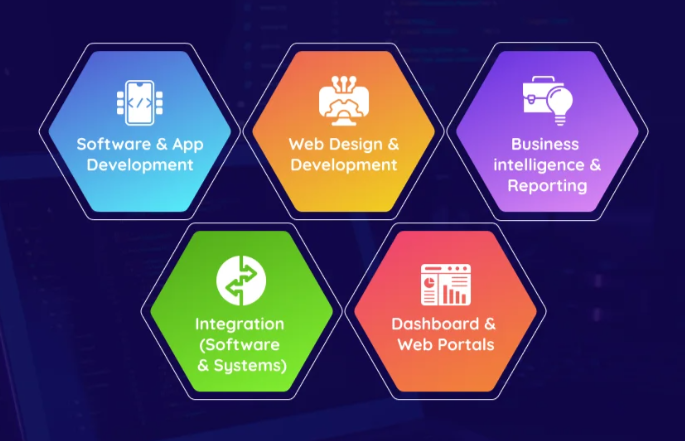For software development firms, keeping pace with the lighting-fast evolution of programming languages, frameworks, methodologies and best practices is an immense challenge. Even the most forward-thinking internal teams risk falling into skill stagnation ruts over time. Priorities shift toward maintaining existing codebases rather than continuous training. And finding gaps in capabilities gets delayed when heads are perpetually down grinding.
This is where the unique advantages of outsourced software partners come in. External developers enjoy more flexibility to proactively upskill across bleeding edge technologies given fewer ingrained legacy distractions. Outsourced teams also gain perspective by collaborating across more diverse client engagements versus being siloed within a single company.
Fresh ideas and skill sets pollinate an agile software firm through external developer partnerships fueling innovation differently than insourced-only models. Access to specialised experts also prevents capability gaps from being masked by institutional biases of all-internal squads.
In this piece, we’ll explore how outsourced software partners provide insourcing teams both development talent and process advantages uniquely suited to avoiding skill stagnation traps in our rapidly changing industry.
Maintaining Motivation Through Variety

Outsourced developers possess a unique advantage: their work spans diverse client projects, freeing them from the monotony of a single codebase. This constant exposure to fresh challenges fuels their motivation and sharpens their technology skills. Unlike in-house developers who may become entrenched in routine, external teams thrive on continuous learning.
Moreover, outsourced partners engage in creative explorations across various client contexts. These ventures yield unexpected optimisations and novel solutions. When integrated by in-house developers, these insights enhance existing systems and elevate overall performance.
In summary, embracing variety—whether through project diversity or collaborative partnerships—fuels motivation, fosters innovation, and propels technological growth. 🚀✨
Transferable Skills Through Exposure

Outsourced teams possess a remarkable ability to transfer skills across diverse domains. Imagine a front-end expert adept at crafting intricate healthcare data dashboards. Their proficiency extends beyond the confines of a single industry. Here’s how:
-
Vertical Agility: Outsourced developers seamlessly pivot from one client vertical to another. Their expertise in healthcare interfaces, for instance, can be ingeniously repurposed for financial analytics or e-commerce platforms. This adaptability ensures that valuable skills remain relevant across industries.
-
Creative Adaptation: The same front-end wizard who designs data-rich medical dashboards can apply interface principles to entirely different contexts. By creatively adapting their knowledge, they enhance business insights across various visualisation needs. Whether it’s a sales dashboard or an educational platform, their skills transcend boundaries.
-
Innovation Catalyst: The cross-pollination of ideas between industries sparks innovation. Unlike internal development silos, where familiarity breeds complacency, outsourced teams thrive on fresh challenges. Their exposure to diverse projects fuels creativity, leading to unexpected optimisations and novel solutions.
In summary, transferable skills acquired through exposure—whether across verticals or industries—act as a bridge between domains. They empower developers to innovate, adapt, and contribute meaningfully, transcending the limitations of internal-only development. 🌟🚀
Objective View Spots Gaps

In the dynamic landscape of organizational development, external consultants play a pivotal role in illuminating blind spots that often elude internal teams. These blind spots, concealed by familiarity and status quo bias, can hinder progress and innovation. Here’s how objective assessments from trusted partners shed light on these critical gaps:
-
Unmasking Specialisations: Long-tenured internal teams may inadvertently overlook vital specialisations. Their entrenched perspective can lead to assumptions that all necessary skills are present. However, external consultants, unburdened by organisational history, objectively identify missing capabilities. Whether it’s advanced data analytics, user experience design, or emerging technologies, these specialists reveal where internal teams fall short.
-
Legacy Solution Blindspots: Over time, internal teams become accustomed to existing systems and processes. While this familiarity ensures operational stability, it can also create blind spots. Outsourced partners, with fresh eyes, scrutinise legacy solutions. They question assumptions, challenge outdated practices, and uncover hidden inefficiencies. By doing so, they pave the way for modernisation and optimisation.
-
Balancing Strengths and Project Demands: Objective reviews compare internal developer strengths against project requirements. Are there gaps in expertise? Are certain skills underutilised? Outsourced consultants provide an unbiased assessment, aligning capabilities with strategic goals. Their recommendations guide targeted skill development and resource allocation.
In summary, embracing external perspectives—free from internal biases—enhances organisational agility. By acknowledging and addressing blind spots, companies position themselves for growth and resilience. 🌟🔍
Conclusion: Staying Relevant Through Partnerships
Ultimately, the speed of technological change moves too quickly for firms to remain expert generalists alone. Outsourced software partners provide insider development teams both talent growth and process rejuvenation. This creative friction is key for establishing balanced engineering ecosystems that proactively uplevel capabilities. Teams avoiding stagnation tend to put equal emphasis on leveraging external specialists as internal generalists to meet evolving client needs. A collaborative insourcing approach paired with outsourced software partnerships sustains relevance even as projects and methods transform.

To discuss how C9 can assist with modernising your outdated business software, contact us today. Our team of experts is here to help your company embrace the future.
Follow C9 on Facebook, Twitter, LinkedIn, YouTube, and view our location on Google Maps. Connect with our CEO Marcus Eddy on LinkedIn.
Software Development Learning Centre
Navigate through our extensive catalogue of articles showcasing progressive development practises, industry transformations, and expert perspectives. From streamlined coding approaches to sophisticated system designs, our in-depth resources will enrich your programming expertise and elevate your development capabilities.
Building a Humane Economy for Animals & Wildlife: The Role of Software and Technology
Top 15 Desktop Software Development FAQs Answered by C9
Custom Bespoke Software Development for Agriculture & Farming in Australia
Building a Future-Proof Business with Scalable Bespoke Software Development
5 Ways Bespoke Software Can Solve Your Inventory Management Headaches
System and App Integration FAQs Answered by C9 Software
Software Development FAQ answered by C9
The ROI of Custom Software Development: A Guide for Australian Businesses
Beyond the Build: Tips & Tricks to Maximise Efficiency with Custom Software (Australian Businesses)
Scaling with Confidence: Future-Proof Your Business with Scalable Software
AI-Powered Bespoke Software: Building the Future, One App at a Time
Reduce Operational Costs with Custom Logistics Software
5 Ways Custom Software Can Improve Your Retail Business
Avoiding Skill Stagnation with Outsourced Software Partners
The True Hourly Cost of Inhouse vs Outsourced Software Development Team
What are the Benefits and Drawbacks of Inhouse and Outsourcing Software Development Project Management & Administration?
What You Need to Know About Insourced vs Outsourced Software Development Services
Understand the Advantages and Disadvantages of Internal vs. External Software Development for Business Analysis
Modernise Antiquated Business Software Before It's Too Late
Custom Software Development: The Secret Weapon to Boost Your Business's Success
Empower Your Team: Citizen Developers and the Rise of Low-Code/No-Code in Australia